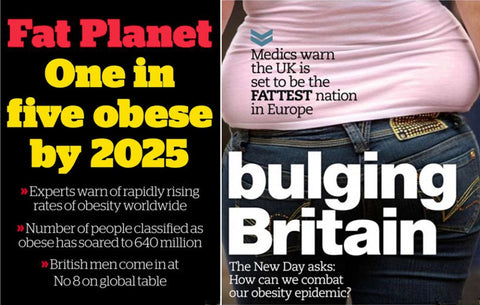World media is focused at the moment on the benefits of adequate amounts of undisturbed sleep, and the health problems this creates. The research, led by scientists from Imperial College London and published in The Lancet, compared body mass index (BMI) among almost 20 million adult men and women from 1975 to 2014.
It found obesity in men has tripled and more than doubled in women.

The world’s newspapers, plus the leading TV stations and Internet News Channels, have all headlined with the story this week that obesity is quite literally a massive growing world problem.
No country is excluded from this. The study, which pooled data from adults in 186 countries, found that the number of obese people worldwide had risen from 105 million in 1975 to 641 million in 2014. This equates to 266 million obese men and 375 million obese women in the world at the end of 2014.
It’s a vicious, ever turning circle. Health research has shown that disturbed nights due to either snoring or sleep apnoea causes late night snacking and as a consequence weight gain – and as a result the increased weight also narrows the throat to cause even worse levels of snoring.
The research also found:
- More obese men and women now live in China and the USA than in any other country
- Almost a fifth of the world’s obese adults – 118 million – live in only six high-income English-speaking countries – Australia, Canada, Republic of Ireland, New Zealand, UK, and the US
- Women in the UK have the third highest BMI in Europe and the 10th highest for men
- By 2025, the UK is projected to have the highest levels of obese women in Europe (38%), followed by Republic of Ireland (37%) and Malta (34%)
Other statistics from the study include:
- China has the largest number of obese people in the world with 43.2 million men and 46.4 million women
- The US has 41.7 million obese men and 46.1 million obese women
In comparison in the UK the study found 6.8 million obese men in 2014, and 7.7 million obese women.
The average adult in the United Kingdom sleeps for 6.8 hours a night, which is below the 7.7 hours people feel they need according to the Royal Society for Public Health (RSPH), and the figures according to other sources are almost identical for the North America, Australia, and Europe
This lower sleep level doesn’t sound much but it amounts to losing an entire night’s sleep over the course of a week.
The RSPH, which represents around 6,000 public health specialists, said poor sleep has been undeniably linked to a range of conditions including:
- cancer
- diabetes
- heart attack
- depression
It has called on the Government to introduce national sleep guidance and both instigate and support policies that reduce and control sleep disorders.
“We do need to wake up to the benefits of sleep – there is a wealth of evidence that lack of sleep is damaging the public’s health,” said Shirley Cramer chief executive of RSPH.
She added: “Efforts to combat this shortfall could be as critical to optimising our health and wellbeing as maintaining an active lifestyle or having a healthy diet.”
Yet again this is conclusive evidence that snoring, sleep apnoea, and other sleep disorders damage your health. You need to do something about it yourself if the Government won’t act on your behalf.
